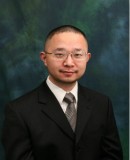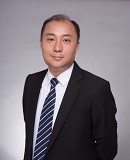主题演讲人
 Zhou.jpg)
Huiyu (Joe) Zhou
Professor
School of Computing and Mathematical Sciences, University of Leicester, United Kingdom
Speech Title: New artificial intelligence technologies in healthcare
Abstract: Artificial intelligence has significantly influenced the health sector for years by delivering novel assistive technologies from robotic surgery to versatile biosensors that enable remote diagnosis and efficient treatment. While the COVID-19 pandemic is devastating, the uses of AI in the healthcare sector are dramatically increasing and it is a critical time to look at its impact in different aspects. In this talk, I will introduce the application of new deep learning models in medical image understanding. Then, I will discuss Parkinson’s disease (PD) whilst investigating the behaviour analysis of PD mice. I also present the use of machine learning technologies in sentiment analysis, followed by the discussion on several challenges.

Schahram Dustdar
Professor
Head of the Distributed Systems Group, TU Wien, Austria
Speech Title: Learning and reasoning for distributed computing continuum ecosystems
Abstract: A captivating set of hypotheses from the field of neuroscience suggests that human and animal brain mechanisms result from few powerful principles. If proved to be accurate, these assumptions could open a deep understanding of the way humans and animals manage to cope with the unpredictability of events and imagination. Modern distributed systems also deal with uncertain scenarios, where environments, infrastructures, and applications are widely diverse. In the scope of IoT-Edge-Fog-Cloud computing, leveraging these neuroscience-inspired principles and mechanisms could aid in building more flexible solutions able to generalize over different environments.

Qixin Wang
Associate Professor
Department of Computing, The Hong Kong Polytechnic University, China
Speech Title: Coming soon

Hongbo Jiang
Distinguished Professor and Vice Dean
College of Computer Science and Electronic Engineering, Hunan University, China
Speech Title: For safety driving with COST IoT Devices
Abstract: Dangerous driving due to drowsiness and distraction is the main cause of traffic accidents, resulting in casualties and economic loss. There is an urgent need to address this problem by accurately detecting dangerous driving behaviors and generating real-time alerts. In this talk, we focus on two techniques for safety driving with COST IoT Devices. The first one is to detect dangerous driving actions and generates real-time alarms using off-the-shelf smartphones. The second one is to detect drowsy driving where the time and frequency of the driver's blinking are usually detected to determine whether the driver enters drowsy driving, using commercial-grade IR-UWB radar.

Witold Pedrycz
Professor and Canada Research Chair
Department of Electrical & Computer Engineering, University of Alberta, Canada
Speech Title: Federated Learning, Knowledge Transfer, and Knowledge Distillation: Developments with Information Granules
Abstract: The visible trends of Machine Learning addressing the emerging needs of coping with the diversity of real-world motivated learning scenarios involve federated learning, transfer learning, and knowledge distillation. We advocate that to conveniently address these challenges encountered in these directions, it becomes beneficial to engage the fundamental framework of Granular Computing to enhance the above approaches or to establish new and augmented methodologies. We demonstrate that various ways of conceptualization of information granules in the form of fuzzy sets, sets, rough sets, among others, lead to efficient solutions. To establish a sound conceptual modeling framework, we include a brief discussion of concepts of information granules and Granular Computing. In the sequel, a concise information granules-oriented design of rule-based architectures is discussed. A way of forming the rules through unsupervised federated learning is investigated along with algorithmic developments. A granular characterization of the model formed by the server vis-a-vis data located at individual clients is presented. It is demonstrated that the quality of the rules at the client’s end is described in terms of granular parameters and subsequently the global model becomes represented as a granular model. Subsequently, the roles of granular augmentations of models in the setting of granular knowledge transfer and knowledge distillation, in particular, are discussed.

Jinpeng Chen
Associate Professor
School of Computer Science, Beijing University of Posts & Telecommunications, China
Speech Title: Sequential Intention-aware Recommender based on User Interaction Graph
Abstract: The next-item recommendation problem has received more and more attention from researchers in recent years. Ignoring the implicit item semantic information, existing algorithms focus more on the user-item binary relationship and suffer from high data sparsity. Inspired by the fact that user's decision-making process is often influenced by both intention and preference, this paper presents a SequentiAl inTentiOn-aware Recommender based on a user Interaction graph (Satori). In Satori, we first use a novel user interaction graph to construct relationships between users, items, and categories. Then, we leverage a graph attention network to extract auxiliary features on the graph and generate the three embeddings. Next, we adopt self-attention mechanism to model user intention and preference respectively which are later combined to form a hybrid user representation. Finally, the hybrid user representation and previously obtained item representation are both sent to the prediction module to calculate the predicted item score. Testing on real-world datasets, the results prove that our approach outperforms state-of-the-art methods.

Dr. Eduardo Rodriguez
Assistant Professor
School of Mathematical Sciences, College of Science and Technology, Wenzhou-Kean University, Wenzhou, China
Speech Title: Innovation Risk in the time of AI
Abstract: Innovation is a means to progress and to create value in a society. Artificial intelligence and digital evolution in the society are opening wonderful opportunities for new generations. These opportunities in the most of the cases require not only to adopt new ways to manage and control emerging processes for the society and businesses, but also to adapt organizations to changes and manage new risks. These risks emerge from multiple dimensions, in particular they are associated with human and machine interactions to perform tasks, solve problems, and make decisions. Moreover, risk is a factor in organizations that require an ongoing observation, assessment and monitoring to properly create and sustain competitive advantages. From the risk management point of view, the purpose of this talk is to reflect on what organizations and people are perceiving about innovation risk, such as how new knowledge creates new risks that require human intervention to mitigate and discover their consequences. The use of data science, artificial intelligence, digitalization, and application of new knowledge to several domains and problems in the society, is moving very fast with an incremental need to review risk related issues such as: ethical principles, regulation, limits of actions, consequences of certain decisions, bias, wrong experiment designs, etc. Innovation risk analysis should be part of the mindset and actions of new data and computer scientists to create solutions in support of humans well-being and in the design of the future. The future is not a fact or result of the predictive analytics models; however, they are possible results to evaluate about potential futures and actions to perform. Data Science-AI has a crucial role in the creation of new knowledge that generates inevitable new risks, and at the same time in mitigating risk of innovation. At the end of this talk the attendee will be in capacity to collaborate in the creation of a mindset in data and computer scientists that proactively contributes to the understanding and control of innovation risk. Their contribution can be in the way to guide and simulate possible futures, orientation to select the futures that could be better and worth to have for the societies.